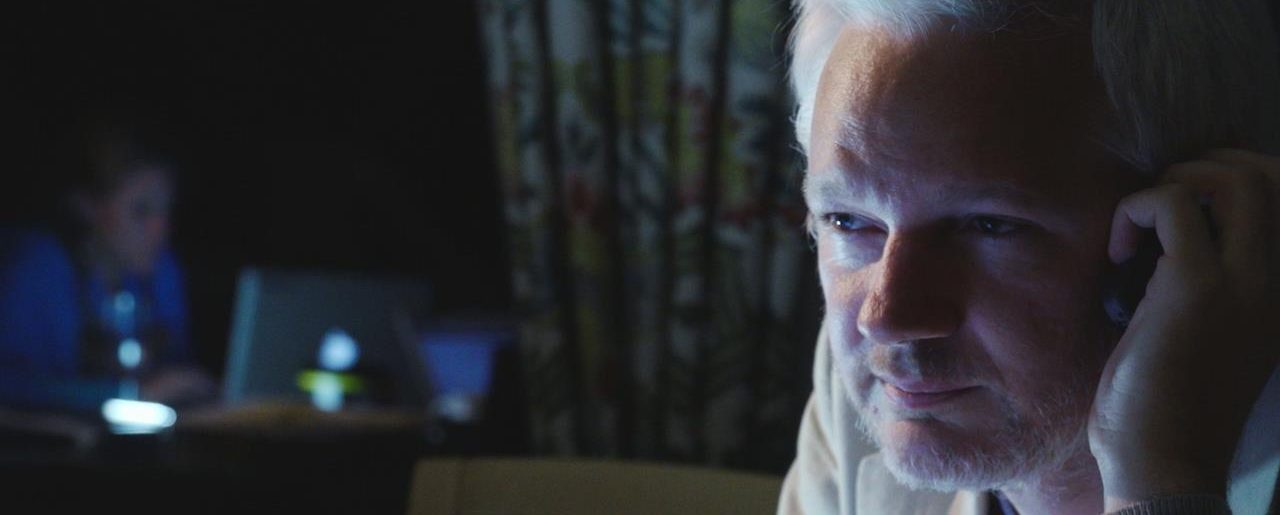
This film is difficult for me. It’s directed by a filmmaker for whom I have great respect: the daring, important, and brilliant Laura Poitras. But its subject is a man I loathe: the cowardly, dangerous, and unreliable Julian Assange. So how am I to take Risk, the new documentary that follows Assange over the course of six years? This film actually started shooting before her Academy Award winning Citizenfour, and it kept going on and on because – every time it seemed like the story was over – Assange or WikiLeaks would pop back in the headlines. Poitras admits the film turned into something she wasn’t expecting. Unfortunately, it turned into pretty much what I’ve thought all along: Assange is coward, a liar, and a sexual deviant.

Look – I get it. Julian Assange is a mysterious and interesting “character”. The whole idea of WikiLeaks is fascinating to a lot of people. But the false humility with which Assange presents himself is so infuriating that it makes watching him speak a true act of endurance. Take, for example, when he and the WikiLeaks attorney Sarah Harrison phone the United States State Department and ask to speak to Hillary Clinton, hoping to inform them about a massive document dump that’s about to take place. It’s all bullshit – the concern, the supposed “morals” behind their vetting process. Julian Assange is calling to gloat. Does he actually think Hillary Clinton is just going to pick up the phone? Or that anyone is going to pick up the phone other than a low level official? It’s that need for relevance and importance that drives Assange to do what he does, regardless of whom it might hurt in the process.

Whereas Citizenfour followed a clear narrative that traced the Snowden ordeal from beginning to end, and offered us new insights and footage into what happened in real time, Risk is all over the map. It’s about Assange, but it’s also about WikiLeaks as a whole. We meet many key players on the WikiLeaks team, including Jacob Appelbaum. Appelbaum is featured now and again, and we don’t really know why, until it’s revealed that he was accused of multiple acts of sexual abuse by various women – one of them even a friend of Poitras. This supports a very real narrative of the environment fostered by WikiLeaks, and also lends credibility to the accusations against Assange by the two women in Switzerland, the reason he’s still living in an Ecuadorian embassy. Poitras doesn’t answer any questions there, but she presents a startling picture.
Poitras says early in the film that she can’t believe Julian is allowing her to film him in such an unrestricted way. She even says she doesn’t know why he trusts her. Laura, he’s allowing you to film him because he’s a power hungry egomaniac who cares more about getting his name tossed around than he does about creating real change. I suspect you know that now. And he doesn’t trust you. He’s using you or, at least, he thought he was. Risk most certainly turned into something Assange hadn’t predicted and, currently, does not support. He gives some backwards reasoning behind it to Poitras late in the film. By then, I had checked out on caring about anything the man had to say. He looks like the human equivalent of slime.

I hate to have such strong opinions about the subject of Risk, but that’s just the baggage I carry with me. As a piece of art, Risk is flawed in that it doesn’t have a clear narrative and can’t decide what film it wants to be. If it’s about Assange, then why are we switching over to watch Appelbaum berate a group of Egyptian businessmen? I suspect that’s because Poitras herself is conflicted about how she feels about both Assange and WikiLeaks. So maybe Risk is successful in many respects – it’s a film of contradictions about a man and organization that are built around contradictions. But, unlike Citizenfour, Risk doesn’t give us an empathetic leading man. Snowden seemed sincere. Assange does not. He seems petty and low. I don’t need my documentaries to be anything other than they are, but I do need to be able see the filmmaker making a real concrete decision about she wants. I just don’t believe Poitras knows, even now.




